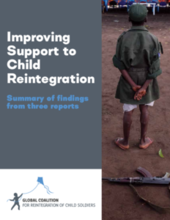Displaying 281 - 290 of 991
In this commentary piece, Aisha K Yousafzai - of the Department of Global Health and Population at the Harvard TH Chan School of Public Health and the and Department of Paediatrics and Child Health at Aga Khan University - notes that "the evidence presented [in the Lancet Group Commission on the institutionalisation and deinstitutionalisation of children] and their call to action to ensure abandoned children can thrive in family-based care environments rather than in institutions matters now more than ever as the global community addresses unprecedented challenges to ensure a generation of children are not left behind with respect to their survival, health, development, learning, and safety."
This document is a summary of three papers on how to effectively support children who have exited armed forces and armed groups and contains actionable recommendations at the end to stimulate thinking and action to assist these most vulnerable children and their communities.
This paper explores how college graduates with foster care histories fare after graduating from a 4-year college that offered a campus-based program.
This guidance from Miracle Foundation outlines case management process and tools aimed at children in Child Care Institutions (CCIs) in India who have been placed with their families during the COVID-19 pandemic. The purpose of these case management processes and tools is to determine feasibility of permanent placement and expedite family-based care in families in which children were placed quickly and without proper preparation during COVID-19 lockdown.
In this video, care professionals and care leavers describe their experiences of participating in the Prepare for Leaving Care Training, co-developed and co-delivered by young people with care experience.
Based on the resilience theory, which highlights the role of one’s social resources in fostering resilience, the current study explored the role of care leavers' formal and informal social networks during the transition to adulthood, from the point of view of 50 young adults and their social workers.
The purpose of this study was to evaluate the consequences of criminal justice–related prenatal substance use policies for family reunification and to examine differences in parental reunification by racial/ethnic group.
This paper examines the frequency with which transition-age foster youth receive asset building services and whether the youth who receive services experience improved outcomes compared to those who do not.
There has recently been increased interest in the potential for formal and informal networks to aid interventions with biological families in helping them achieve reunification in the context of the child protection system. This article analyzes the conceptualization of social support in order to create social support networks.
The Organizational Governance and Accountability Checklist is designed to help determine whether an organisation providing residential care services, and the principal donor (where the principal donor represents an entity), have sufficient governance and accountability structures in place to mitigate, manage and address risks or issues that may arise in the course of transitioning the model of care.




